Visa Advertorial Praises Thailand's Path to Cashless Society
Plus reasons why Thailand will always be a cash based economy...
It’s that time of the month again when public relations adverts masquerade as articles, and non-source-linked polls are cited to exclaim a representative consensus of the nation’s population.
Let’s dig in.
The image used above in the Bangkok Post article is so sad, because it is a common sight in Bangkok. The customer and the seller are both wearing facemasks. The only verbal interaction is:
Customer: “Scan dai mai?" (“Can I pay by scanning a QR code?”)
Seller: “Dai” (“Yes you can”)
Then the seller holds out their phone’s QR code linked to their bank account, and the customer scans the QR code using their banking app.
*Bangkok is not representative of the rest of Thailand.
Quoting from the aforementioned article:
Thailand is expected to transition to a cashless society faster than its regional peers, driven by the country's rapid digital adoption and transformation, according to a Visa survey.
Visa, a leading global digital payment service provider, recently conducted the Consumer Payment Attitude Study and found that Thailand could become a cashless society by 2028, ahead of the Asean region overall, which is expected to reach this milestone post-2028.
The survey revealed 22% of Thai consumers believe a cashless society will emerge between 2026 and 2028, compared to 16% of consumers across Asean.
First off, I want to express my disappointment in MSM outlets including the Bangkok Post for never linking to any study they cite. Ever. Poor journalistic standards.
It took some digging to find that the latest Visa Consumer Payment Attitude Study was from 2022.
Here is the direct download link.
Here is the PDF to download directly from this Substack page:
The visa study itself is full of pretty infographics, bar charts, and icons; in line with the ongoing infantilisation of the adult populace.
Sample size?
Demographic sample split?
Sample area by province or city?
Hidden and tucked away on the final page in small print:
The combined populations of these countries via Worldpopulationreview.com:
Singapore: 5,850,808
Malaysia: 32,360,988
Thailand: 69,279,051
Indonesia: 268,933,842
Philippines: 116,087,266
Vietnam: 101,148,796
Cambodia: 16,431,046
A total combined population of 610,091,797 for all those countries. The Visa study sample among 6,520 consumers comprises a mere 0.001 percentile.
Hardly representative. A representative sample size should be between 1-3% of the population, at a minimum.
Let us examine some of the charts, claims, and skewed biases in the alleged survey results…
It is interesting yet unsurprising how the Visa study doubles down on linking safety in cashless payments with the Covid-19 scamdemic, after this initial consciousness-seeding phraseology of the “view cashless as a safer way to pay” ethos.
The “pandemic” has been so great at accelerating all things totalitarian, surveillable, and trackable, hasn’t it?!
Let’s translate the above graphic’s Benefits of a cashless society, shall we?
Safer transactions = all transactions monitored in real time, linked to your social credit score and carbon credit allowance, allowing the state to de-bank and unperson you, ban you from being able to travel, from being able to buy food, or allow you to partake in society, in any way, shape, or form - if you step out of line.
Greater convenience and less hassle = Forced to carry your phone or smart watch with you at all times to transact anywhere, anytime.
No phone means no food. Aka China style. A huge disaster and displacement of the masses would lead to images of people crowding around power outlets to charge their phones. *Cash still functions in a grid down scenario or natural disaster.
Ease of tracking financial records = All tax automated at point of sale, taxes incurred instantaneously as you make foreign remittances. Opens the door to retroactive taxes and capital controls. Potential automated bail-ins if a financial crisis is declared. Related to the common reporting standards (see further recommended reading links at end of article).
It amuses me how all the questions are slanted in favour of cashless, cashless, cashless!
So. Let’s do a quick survey right here right now, slanting it the other way for the sake of diversity, equity, and inclusion fairness:
At least this infographic from the Visa report shows that 86% of people still use cash as a payment method.
FACTORS PROTECTING CASH PRESERVATION
One of the most obvious factors is that the innately rife corruption at all levels of government absolutely depends on cash bribes. I can’t see a government official doing a traceable CBDC transfer as a backhander to win a government construction contract for their cousin, can you?
Here are some headlines making my point:
I have applied for a yearly Business visa (non immigrant B-A) at Phuket Imm-office, because I have a work permit in my company here.
I am now on my third monthly extension, and now it looks like that they want some money from me. My accountant, who handles the visa paper work, say that I must pay 10,000 baht under table to get my yearly extension, otherwise I'll be rejected.
Is this too much, or is it the normal procedure?
Regardless of the corruption industrial complex of Thailand depending on brown envelopes stuffed with cash, I am sure the government will still push cashless hard - on the serfs - for all private transactions. The rest will be merely lip service. I would be very surprised if all government institutions go cashless - such as immigration and the department of land and transport.
Watch what they do, not what they say.
Another factor that bodes well for the importance of cash perception by Thais, is that owing to pressure from distrusting and disgruntled citizens over the 10,000 THB digital wallet (CBDC) handout to Thais eligible - the government capitulated and actually made direct bank transfers instead.
This also served as a populist measure to show Thais holding their banknotes for media photoshoots:
This article is interesting because it quotes government spokespeople saying that Thais can spend the 10,000 THB cash handout however they please. Whereas before it was explicitly said that it would be via the digital wallet, could only be spent on government approved items, and only within a 4km radius of someone’s house registration address.
I imagine that the rest of the Thais waiting for their handout will cry foul if asked to accept the CBDC tokens, instead of a direct bank transfer which they can then withdraw as cold hard cash.
Still, the entire premise of this stimulus scheme is dangerous and fiscally irresponsible, but that is not the theme of this article so I shall leave that sentiment there.
Thailand is still a cash economy. Market vendors and taxi drivers like cash - even if more of them have a QR code hanging from a string as an option. Motorbike taxi drivers operate too quickly to mess around with QR code payments, they like cash.
If I go to virtually any ATM throughout Bangkok at anytime, day or night, there will usually be someone in front of me or behind me in a queue, waiting to withdraw cash.
Let us finish with comments from the initial Bangkok Post article on a cashless society:
FURTHER RECOMMENDED READING AND VIEWING
Thailand CBDC Goes Live
This is an important, timely, and well articulated video. I have a great deal of respect for Benjamin Hart. He is an intelligent critical thinker. I have corrected and formatted the video transcript below, via the YouTube transcript feature, adding in hyperlinks to the articles referenced by Ben.
The Common Reporting Standards (CRS) Dragnet, CBDC Pilots, and Thailand's Foreign Income Tax Law Effective 1st January 2024
Expect to hear more about Common Reporting Standards (CRS) in 2024. CRS refers to an existing agreement between banking institutions in multiple different jurisdictions, territories, and countries. According to Organisation For Economic Co-operation and Development
Nicholas Creed is a Bangkok based writer. Any support is greatly appreciated. If you are in a position to donate a virtual coffee or crypto, it would mean the world of difference. Paid subscribers can comment on articles, videos, and podcasts, and also receive a monthly subscriber newsletter. Email: nicholas.creed@protonmail.com to enquire about a crypto-paid discounted annual subscription.
Bitcoin address:
bc1p0eujhumczzeh06t40fn9lz6n6z72c5zrcy0are25dhwk7kew8hwq2tmyqj
Solana address:
Ds6QpUxaWB6bJ8WF4KAazbuV25ZhPRdZh4q4BXutj4Ec
Ethereum address:
0x42A7FA91766a46D42b13d5a56dC5B01c153F1177
Monero address:
86nUmkrzChrCS4v5j6g3dtWy6RZAAazfCPsC8QLt7cEndNhMpouzabBXFvhTVFH3u3UsA1yTCkDvwRyGQNnK74Q2AoJs6




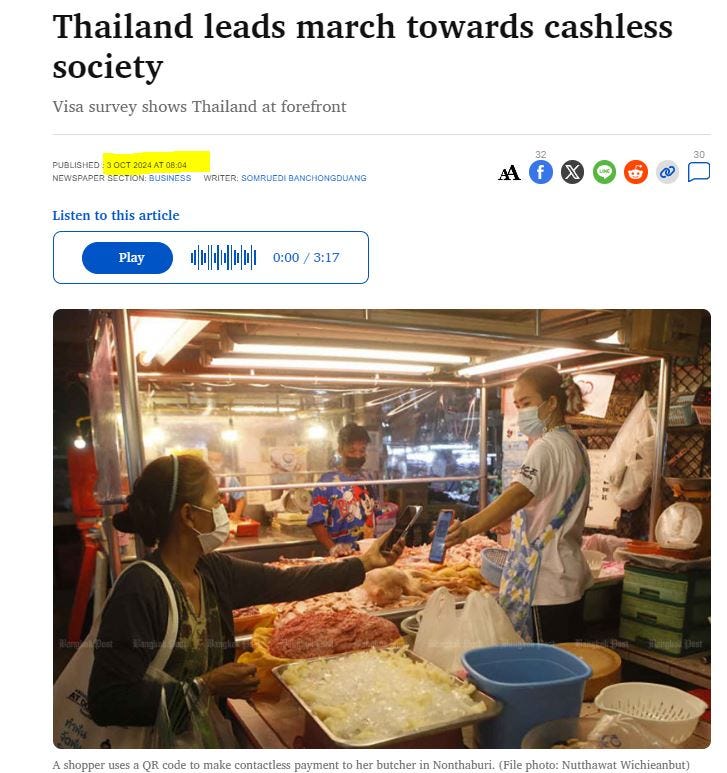



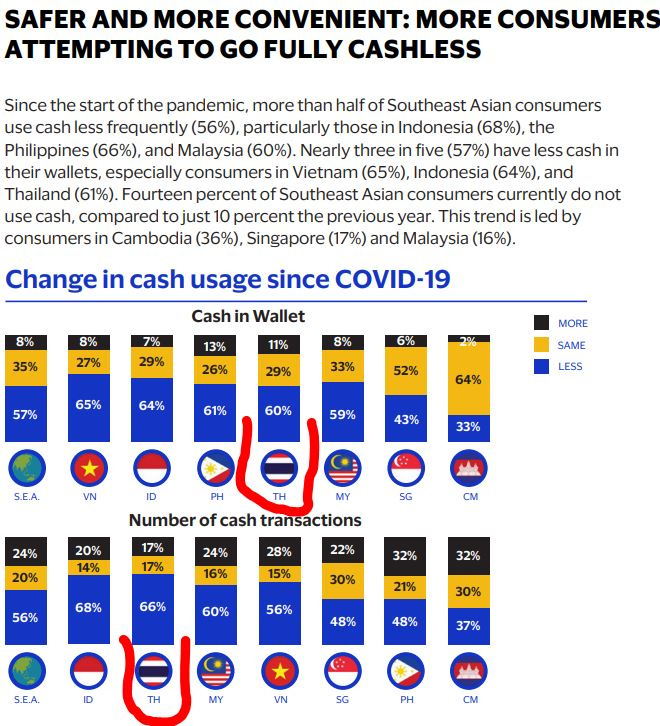

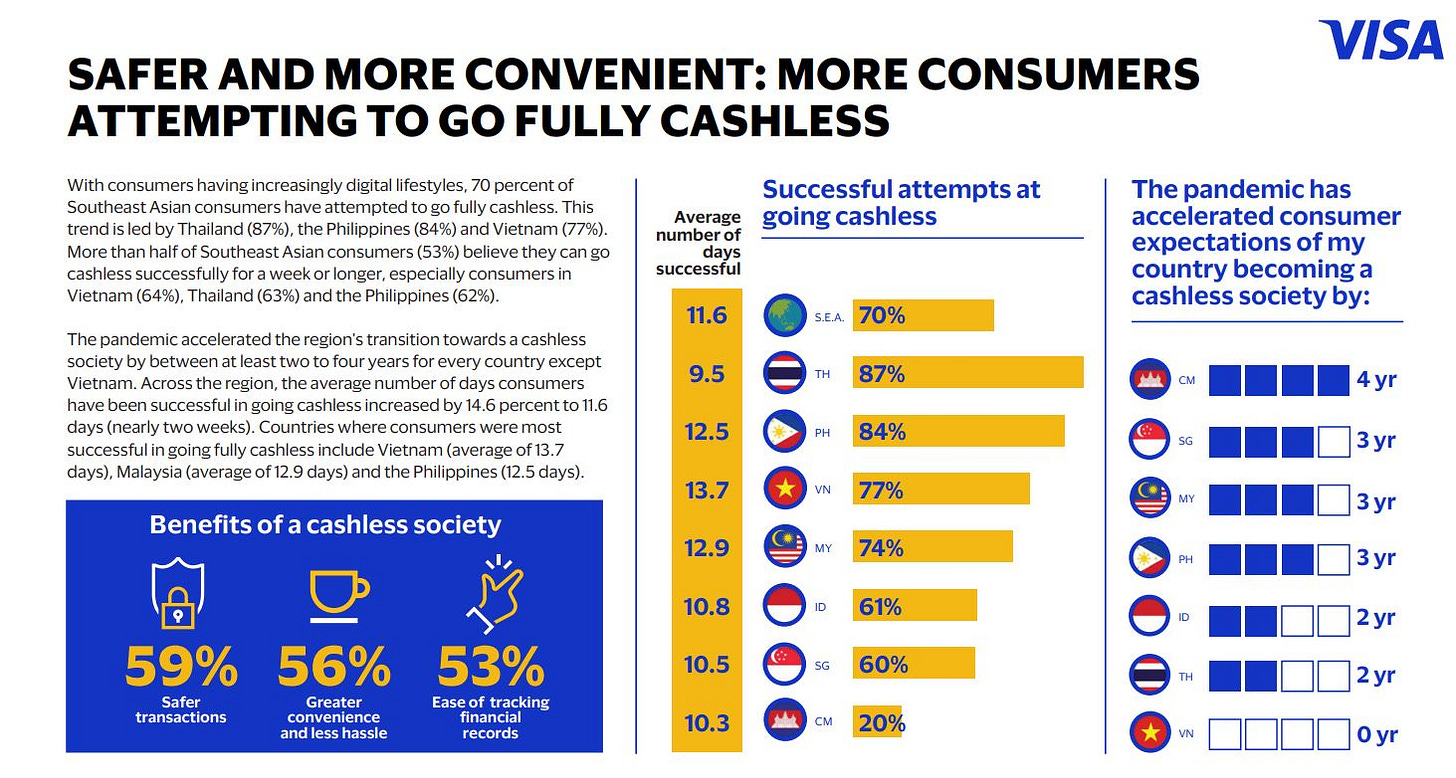
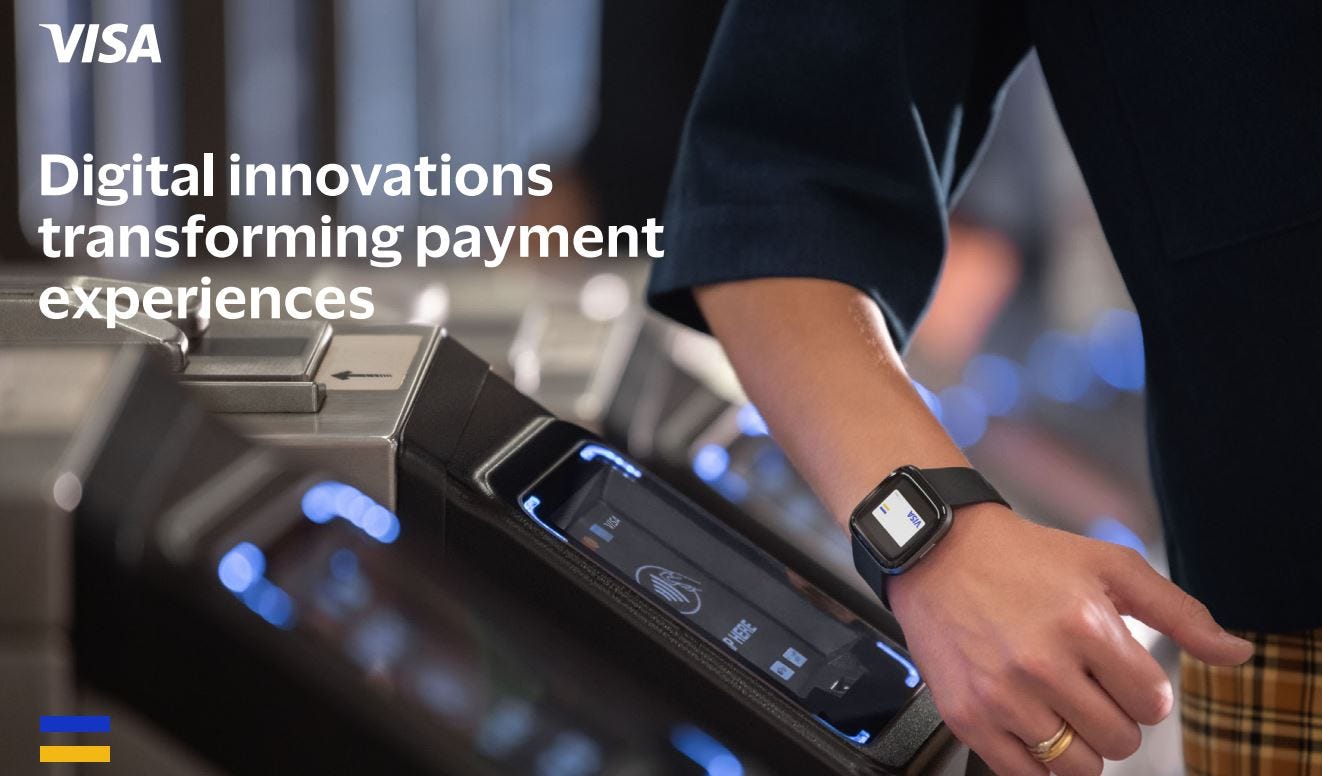
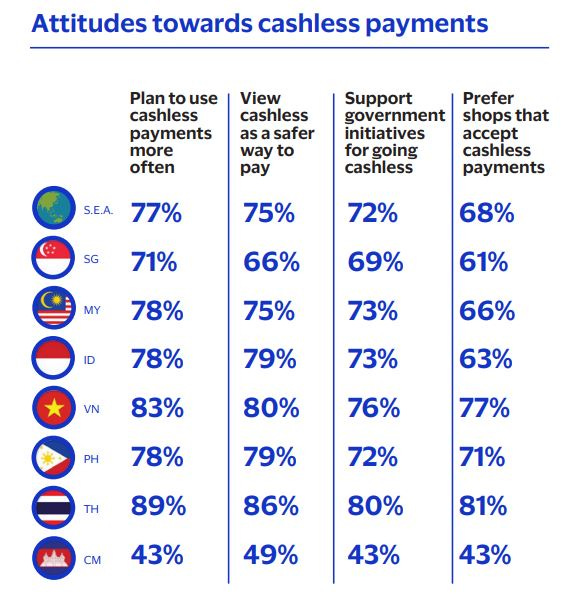
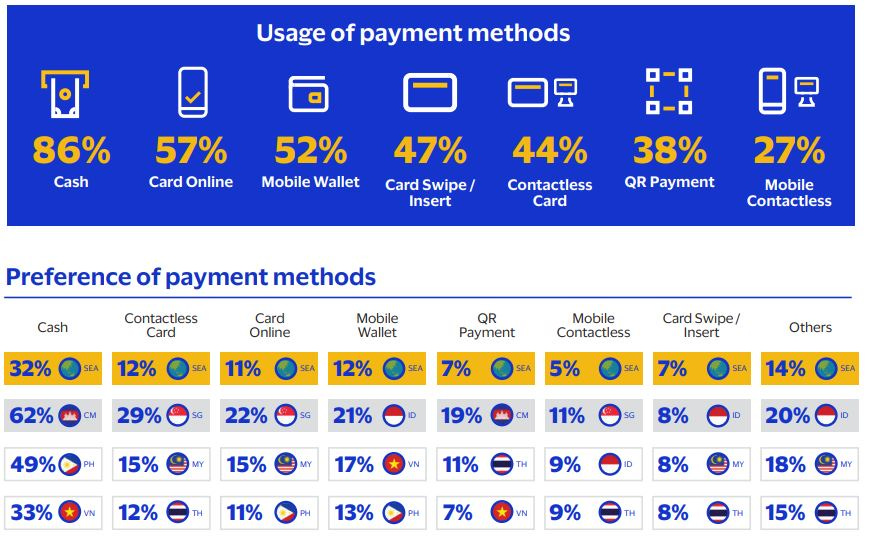
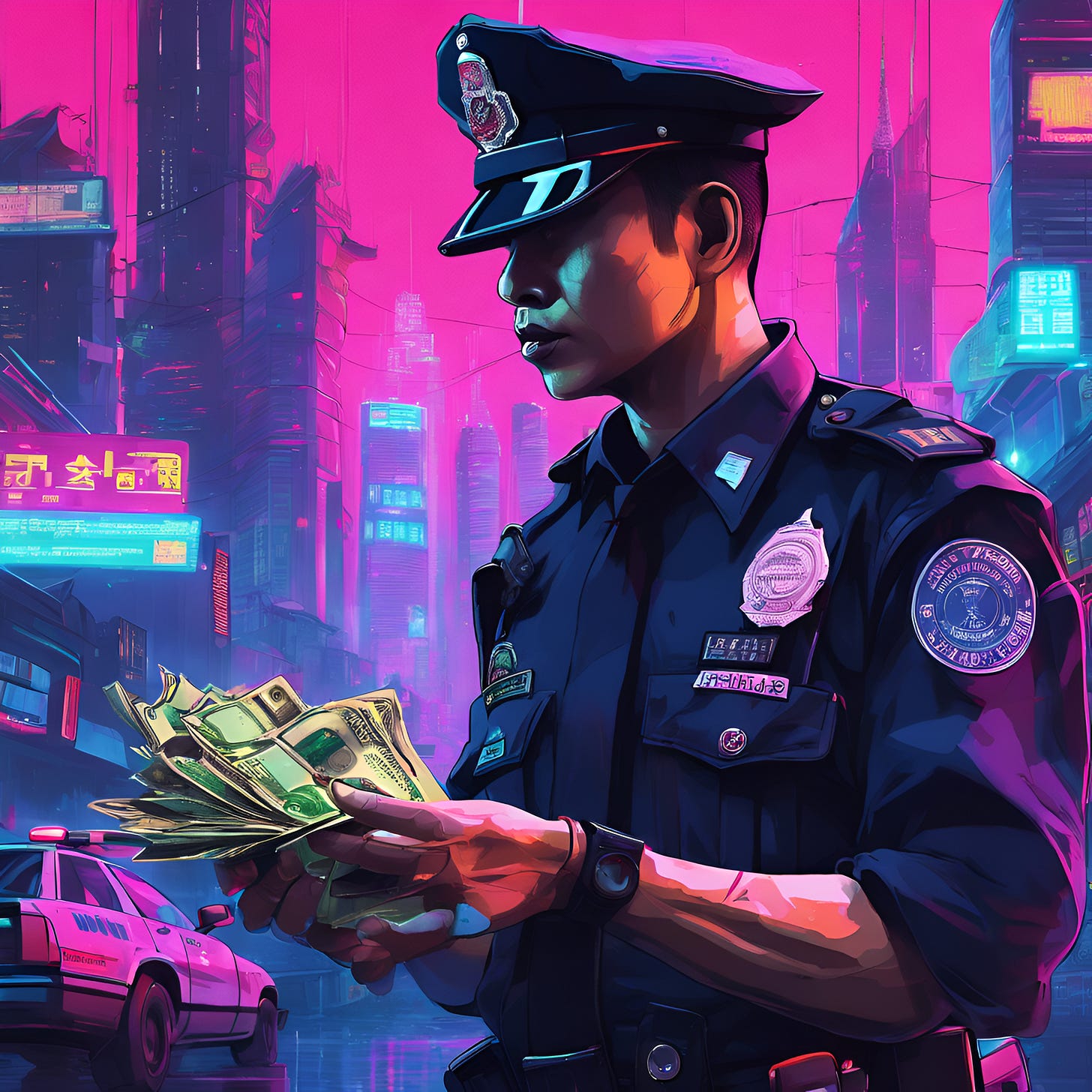




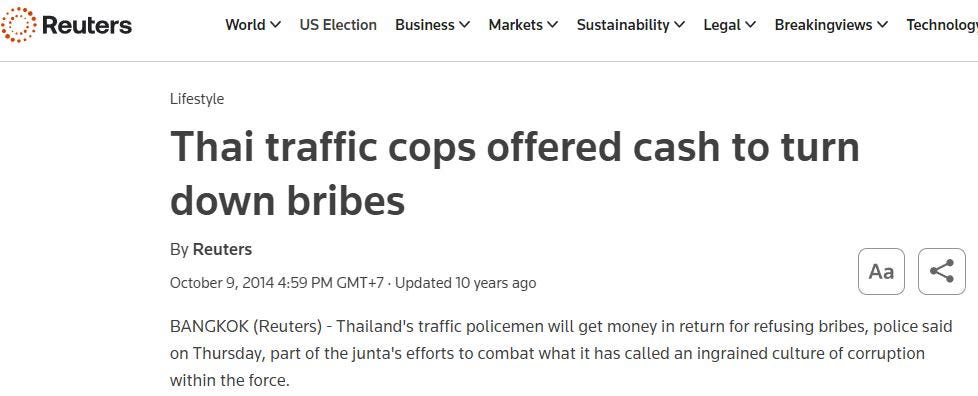

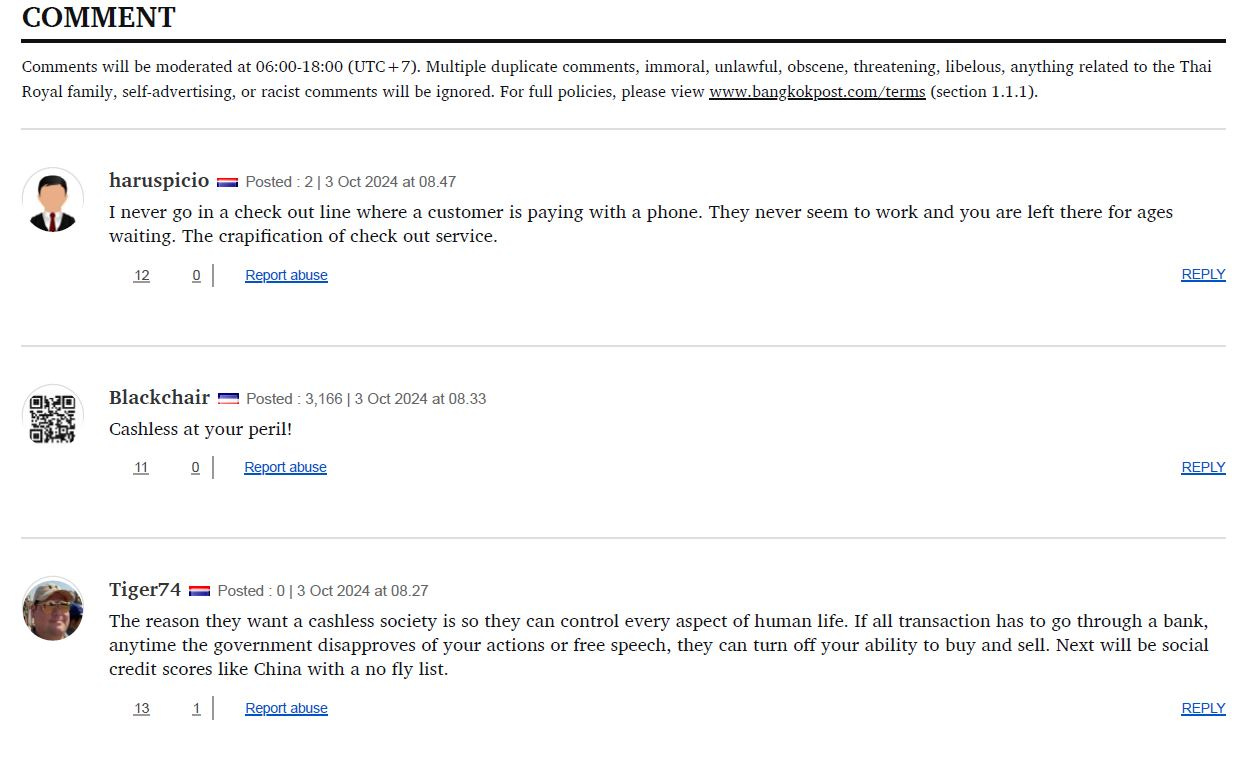

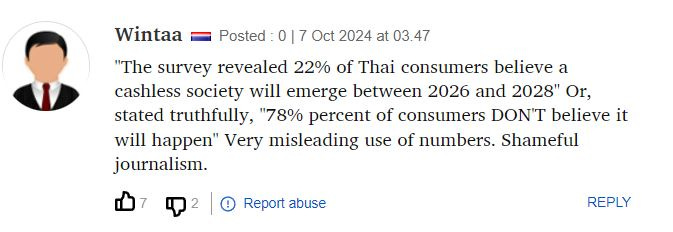
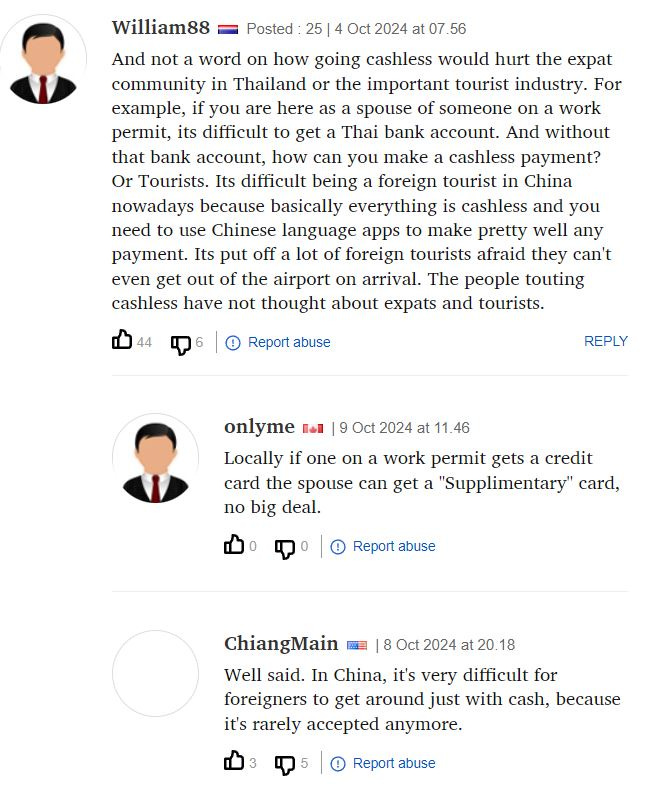
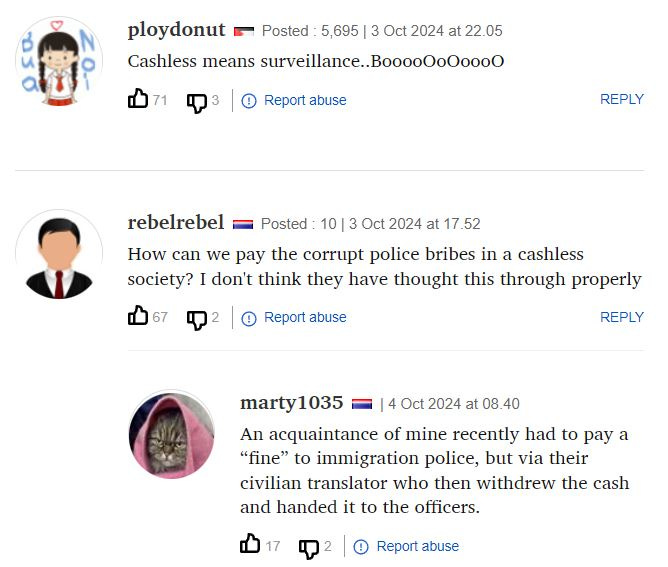
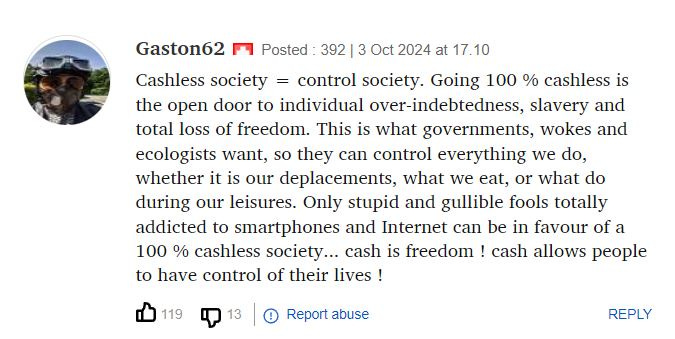




I have never once used a phone based QR esque code app to pay for anything and don't plan on ever doing so. As is our phone, largely only kept as a satellite internet hotspot for the camp, has been stolen again, being the second phone and related new Thailand phone number to disappear in six weeks. My guess is that the survey above does not catch that aspect of "convenience" in their survey. I don't even want to imagine how bad it would be if I had been dependent on those dumb devices for much of anything. We had a simple PIN lock on both but my assumption is that somebody has a way of either unlocking it or just selling the parts for cash. I bet they don't take QR codes unless they're with the government already. :-P
I was recently up on a minor infraction at the local immigration office and was told that the fine was 2000B. When I asked for a receipt, the girl looked shocked and disappointed and said that the fine was only 1000 baht if I didn't require a receipt....
How does the cashless society deal with low-level bribery like that, because if they can't, Thailand ain't going cashless any time soon.